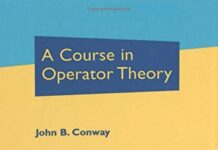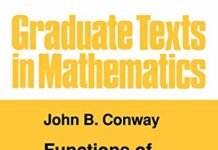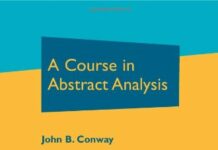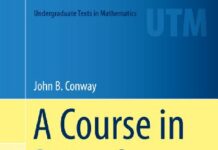
Ebook Info
- Published: 2019
- Number of pages: 416 pages
- Format: PDF
- File Size: 6.94 MB
- Authors: John B Conway
Description
This book is an introductory text in functional analysis. Unlike many modern treatments, it begins with the particular and works its way to the more general. From the reviews: “This book is an excellent text for a first graduate course in functional analysis….Many interesting and important applications are included….It includes an abundance of exercises, and is written in the engaging and lucid style which we have come to expect from the author.” –MATHEMATICAL REVIEWS
User’s Reviews
Reviews from Amazon users which were colected at the time this book was published on the website:
⭐The only reason for 4 stars instead of 5 is that I am not a great fan of Conway’s style, and have wasted too much time on mangled examples in his Complex Analysis.That said, the layout here is superb, and the choice of topics just what is needed to get one of the ground. Beginners will find it useful to have a copy of Kreyszig at hand.
⭐Very good, like new
⭐Great book!
⭐The book is ok. Not really self contained.
⭐Nice book and like new
⭐Like many books on functional analysis, much of the space in this book is used for the spectral theorem. I am interested in function spaces and the correspondence between functional analysis and measure theory. Chapters IV and V of this book give a self-contained development of locally convex spaces and weak topologies on them and their dual spaces. Unlike many introductory books, Conway spells out the notion of a strict inductive limit of locally convex spaces, which is the only systematic way of talking about test functions and distributions. Chapter V, on weak topologies, is excellent, and proves, for example, the Banach-Alaoglu theorem, the Krein-Milman theorem, and proves (following de Branges) the Stone-Weierstrass theorem using the Krein-Milman theorem, although it does not prove the Eberlein-Smulian theorem, for which see Robert E. Megginson, “An Introduction to Banach Space Theory”.
⭐This book is a comprehensive introduction to functional analysis. The style is very formal and rigorous (as it have to be) and you need to have a good background in measure theory and general topology (as it is mentioned in the introduction), chapters 1-4 & 6 of Folland’s real analysis book would be more than enough. I think this background is necessary to fully appreciate this excellent book otherwise this book can be difficult and challenging. Do not forget that this book is designed to be used in grad courses. I definitely recommend this book to anyone who really want/need to learn true functional analysis for graduate work. Through its eleven chapters J. Conway masterfully wrote a beautiful exposition of this core subject.Personally I have never been a follower of Rudin’s books, I always have been able to find a substitute for every Rudin’s book that match better my taste, and in this case Conway’s functional analysis book is undoubtedly my choice. I consider that students interested in operator theory/algebras would appreciate this book even more, you can feel the operator taste throughout the book. Some negative remarks? well I think that the last chapter on Fredholm theory is a bit obscure, it can be largely improved, I would recommend chapter 1 of Gerald Murphy’s book C*-algebras and operator theory for a cleaner and more meaningful exposition of Fredholm operators/index.
⭐This book is a comprehensive introduction to functional analysis. The style is very formal and rigorous (as it have to be) and you need to have a good background in measure theory and general topology (as it is mentioned in the introduction), chapters 1-4 & 6 of Folland’s real analysis book would be more than enough. I think this background is necessary to fully appreciate this excellent book otherwise this book can be difficult and challenging. Do not forget that this book is designed to be used in grad courses. I definitely recommend this book to anyone who really want/need to learn true functional analysis for graduate work. Through its eleven chapters J. Conway masterfully wrote a beautiful exposition of this core subject.Personally I have never been a follower of Rudin’s books, I always have been able to find a substitute for every Rudin’s book that match better my taste, and in this case Conway’s functional analysis book is undoubtedly my choice. I consider that students interested in operator theory/algebras would appreciate this book even more, you can feel the operator taste throughout the book. Some negative remarks? well I think that the last chapter on Fredholm theory is a bit obscure, it can be largely improved, I would recommend chapter 1 of Gerald Murphy’s book C*-algebras and operator theory for a cleaner and more meaningful exposition of Fredholm operators/index.
⭐The binding and paper quality is very bad. It doesn’t seem like a proper hardcover binding. It was really a very disappointing experience to buy the book with this binding.It is a classic book. So the disappointment is much more when you get a copy with such a poor paper quality and binding, which seems more like a scanned version.
⭐Perfect condition and on time.The autor present himself
Keywords
Free Download A Course in Functional Analysis (Graduate Texts in Mathematics Book 96) 2nd Edition in PDF format
A Course in Functional Analysis (Graduate Texts in Mathematics Book 96) 2nd Edition PDF Free Download
Download A Course in Functional Analysis (Graduate Texts in Mathematics Book 96) 2nd Edition 2019 PDF Free
A Course in Functional Analysis (Graduate Texts in Mathematics Book 96) 2nd Edition 2019 PDF Free Download
Download A Course in Functional Analysis (Graduate Texts in Mathematics Book 96) 2nd Edition PDF
Free Download Ebook A Course in Functional Analysis (Graduate Texts in Mathematics Book 96) 2nd Edition




